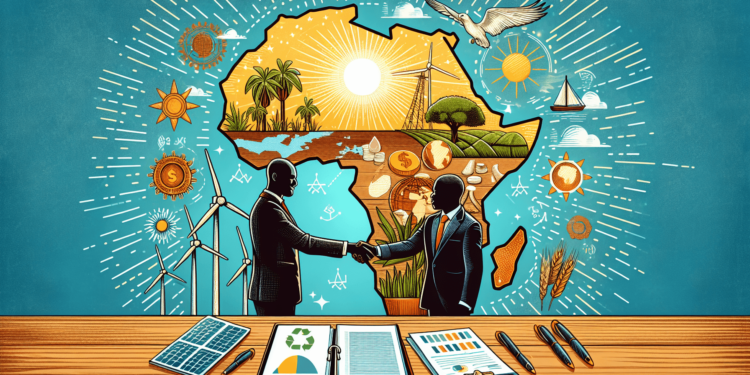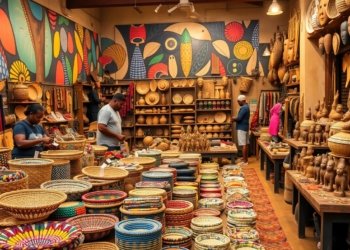Thinking about investing in Africa? You’re not alone. Africa has a growing economy, abundant natural resources, and a youthful population. These factors make it an attractive destination for investors looking to diversify their portfolios.
Let’s take a closer look at why investing in Africa is a smart choice and how you can benefit from the many opportunities available on the continent. Get ready to explore the potential benefits of investing in Africa!
Investing in Africa as a Smart Choice
Prosper Africa Initiative
The Prosper Africa Initiative has a goal to promote investment opportunities in Africa.
It aims to reduce poverty, promote gender equality, address climate change, and improve infrastructure.
The initiative partners with U.S. investors targeting sectors like real estate, mutual funds, and ETFs.
This partnership stimulates economic growth and creates sustainable jobs.
Strategic alliances with stakeholders like VanEck, Fidelity, and the U.S. government support investments in emerging markets such as South Africa, Nigeria, Kenya, and Morocco.
Prosper Africa emphasizes Africa’s natural resources, agriculture, and mining potential to attract investors interested in sustainable cities, affordable housing, and internet connectivity.
The focus is on reducing inequities, creating decent work, and promoting access to markets and skills.
Investment Opportunities in Africa
Investment opportunities in Africa cover various sectors like real estate, mutual funds, and ETFs. Countries such as South Africa, Egypt, Nigeria, Kenya, and Morocco are important for U.S. investors. American Depositary Receipts (ADRs) have been successful in tapping into Africa’s mining sector. Organizations like VanEck and Fidelity are active in Africa’s emerging markets.
Initiatives like Prosper Africa, supported by the U.S. government, aim to reduce inequities and create sustainable jobs. The Africa Debate, organized by the World Economic Forum, emphasizes investing in sustainable cities, communities, and infrastructure to address poverty and achieve zero hunger. Africa also offers opportunities in trade, gender equality, and climate action.
Investors can support Africa’s youth and promote decent work, affordable housing, and internet connectivity on the continent.
Real Estate Sector in Africa
The Real Estate Sector in Africa faces challenges such as limited infrastructure, access to skills, and internet connectivity.
These trends hinder the sector’s growth potential, impacting investors looking to enter the market.
Despite these hurdles, Africa offers substantial investment opportunities in real estate compared to other regions.
Countries like South Africa, Egypt, Nigeria, Kenya, and Morocco attract investors due to their emerging markets and natural resources.
American depositary receipts and ETFs like Vaneck and Fidelity provide U.S. investors with avenues to invest in Africa’s real estate sector.
Initiatives like Prosper Africa, supported by the U.S. government, aim to reduce inequities, promote sustainable jobs, and address issues like zero hunger and gender equality in Africa.
This aligns with the continent’s efforts to create sustainable cities and communities while combating climate change.
The youth in Africa are pivotal stakeholders, driving innovation and growth in sectors beyond real estate, such as agriculture and mining.
According to the World Economic Forum, investing in Africa can lead to sustainable economic prosperity for the continent.
Financial Services Industry Growth
The financial services industry in Africa is growing rapidly. Factors like increased trade with global investors are fueling this growth.
Countries such as South Africa, Egypt, Nigeria, Kenya, and Morocco are seeing a rise in real estate investments, mutual funds, and ETFs.
Organizations like VanEck, Fidelity, and the U.S. government are actively supporting initiatives like Prosper Africa to boost investment opportunities in Africa.
African stakeholders are considering the future of the economy, especially in sectors like agriculture, mining, and natural resources.
The continent is also focusing on reducing inequities and supporting sustainable development goals such as zero hunger, gender equality, and climate action.
With a large youth population, Africa is investing in infrastructure, internet connectivity, and access to markets and skills to create jobs, affordable housing, and sustainable cities.
This dynamic environment offers opportunities for innovation and growth in the financial services industry, attracting U.S. investors and promoting economic prosperity for all.
Tools for Investing in Africa
Infrastructure Development in Africa
Building infrastructure in Africa faces challenges like limited financing, skills shortage, and regulatory constraints. However, it also offers opportunities for investors in real estate, mutual funds, and ETFs.
South Africa and Egypt demonstrate growth potential through initiatives like Prosper Africa, aiming to reduce poverty and develop infrastructure. China’s involvement in African projects, highlighted by the World Economic Forum, presents significant investment prospects.
The U.S. government supports investments in sectors like mining and agriculture. Technology advancements can improve infrastructure by enhancing internet access, market reach, and job sustainability.
Strategies to attract more investment include enhancing skills access, promoting sustainable cities, and reducing inequalities. Key stakeholders like Fidelity and Vaneck view Africa as a promising investment hub. Sectors such as natural resources, youth employment, and affordable housing in Nigeria, Kenya, and Morocco are particularly attractive.
The Africa Debate initiative focuses on encouraging investment, fostering memberships, and advocating for climate action and gender equality across the continent.
Unlocking Investment Opportunities with Technology
Technology in Africa is changing investment opportunities in different sectors. It’s improving internet connectivity and access to markets, making it easier for investors, including those from the U.S., to explore Africa’s emerging markets.
Real estate and mutual funds are growing in popularity, with companies like Fidelity and VanEck offering American Depositary Receipts for investments in African markets such as Nigeria, Kenya, and Morocco.
Furthermore, technology is helping to reduce inequities by promoting sustainable jobs, affordable housing, and climate action in countries like South Africa and Egypt.
Initiatives like the World Economic Forum’s Invest Africa, supported by the U.S. Government’s Prosper Africa program, focus on investing in sectors like agriculture and mining while also developing infrastructure and empowering youth.
Investors, as essential contributors, can use technology to back programs like Zero Hunger, gender equality, and sustainable cities. This contributes to economic growth and prosperity throughout Africa.
Virtual Deal Room for Seamless Investments
A virtual deal room can help with investments in Africa. It gives investors a secure platform to learn about different opportunities on the continent.
Some features for a virtual deal room focused on Africa should include:
- Real-time updates on trade policies in countries like South Africa.
- Investment options in sectors such as real estate, mutual funds like VanEck, and emerging markets like Egypt.
Investors using a virtual deal room can learn about initiatives like Prosper Africa. This helps address issues like poverty and sustainable jobs. The U.S. government can also support African investments through platforms like the Africa Debate. This focuses on reducing inequities and promoting climate action.
Having these features allows investors to explore sectors like natural resources, agriculture, and mining. They can also check out opportunities in countries like Nigeria, Kenya, and Morocco.
Business Case for Investing in Africa
Economic Growth and Stability in Africa
Trade, real estate, mutual funds, and infrastructure are factors contributing to economic growth and stability in Africa.
Countries like South Africa, Egypt, Nigeria, Kenya, and Morocco offer investment opportunities in sectors such as mining, agriculture, and sustainable cities.
The abundance of natural resources in Africa attracts investors from China, the U.S., and U.S. investors seeking sustainable jobs.
Vaneck, Fidelity, and ETFs provide investment options in African markets. Initiatives like Prosper Africa aim to reduce inequities and promote zero hunger and gender equality.
With improved internet connectivity and access to skills, Africa’s youth play a crucial role in shaping the continent’s future.
The World Economic Forum and McKinsey support the Africa Debate, encouraging dialogue on climate action and sustainable development for prosperous African communities.
Natural Resources Abundance in Africa
Africa has abundant natural resources such as agriculture, mining, and oil. These resources attract investments in the region, leading to trade and financial opportunities like mutual funds and American Depositary Receipts.
Countries like South Africa and Egypt exemplify how natural resources, real estate, and infrastructure developments entice investments from stakeholders such as the U.S. government, Fidelity, and Vaneck.
This creates jobs, reduces inequities, and supports gender equality. Africa, as an emerging markets hub, offers vast opportunities for U.S. investors.
China’s involvement in sectors like agriculture and mining further highlights the growth potential. The World Economic Forum focuses on Africa’s investment to achieve goals like Zero Hunger and Climate Action, underscoring the region’s global economic importance.
Nigeria, Kenya, and Morocco are investing in sustainable cities, affordable housing, and internet connectivity to drive sustainable development and economic growth.
Stocks and Investment Potential in African Markets
When assessing stocks and investment potential in African markets, investors should consider:
- The vast array of investment opportunities across sectors like real estate, mutual funds, and ETFs.
- Countries like South Africa, Egypt, Nigeria, and Kenya offer diverse investment prospects in sectors such as mining, agriculture, and infrastructure.
- Pivotal stakeholders like the U.S. government and organizations like the World Economic Forum support initiatives like Prosper Africa to enhance investment opportunities in Africa.
- To navigate risks and opportunities effectively, investors can leverage networks like Fidelity or VanEck for insights and market access.
- Focusing on sustainable development goals such as zero hunger, reduced inequities, and climate action can drive impact, create sustainable jobs, and build communities.
- Investing in Africa can drive economic growth and contribute to fostering gender equality, providing decent work, and promoting affordable housing and sustainable cities.
How to Invest in Africa
Finding Reliable Advisors
When considering investing in Africa, it’s important to choose reliable advisors. Evaluate their credibility and expertise to navigate the continent’s varied investment opportunities.
Factors to consider include:
- Advisor’s knowledge of specific African markets like South Africa or Egypt
- Experience in sectors such as real estate, mutual funds, or mining
- Support for initiatives like Prosper Africa or Zero Hunger and Gender Equality goals
Look for advisors who prioritize:
- Infrastructure projects
- Reduced inequities
- Climate action
Seek advisors with:
- Strong networks in emerging markets
- Understanding of natural resources and agriculture
- Focus on supporting youth employment in countries like Nigeria, Kenya, or Morocco
By vetting advisors based on their expertise, commitment to sustainable practices, and ethical standards, investors can make well-informed decisions about investing in Africa.
Utilizing Investment Toolkits and Resources
Investors can benefit from using investment toolkits and resources to explore opportunities in Africa.
These tools offer information on real estate, mutual funds, and natural resources in countries like South Africa, Egypt, Nigeria, Kenya, and Morocco.
Platforms like Vaneck, Fidelity, and the Africa Debate network provide insights into trade dynamics, emerging markets, and infrastructure projects on the continent.
Considerations include evaluating the political and economic environment, internet connectivity, market access, and skills development.
Virtual deal rooms help to streamline the investment process, especially in sectors like mining, agriculture, and sustainable cities, by enabling secure communication and due diligence.
These resources support U.S. investors in aligning their portfolios with goals such as zero hunger, gender equality, reduced inequities, and climate action.
They contribute to the prosperity of African communities and create sustainable job opportunities for youth.
Exploring Different Investment Sources in Africa
Traditional investment sources in Africa, like real estate and natural resources, have consistently provided returns for investors. However, diversifying into alternative investments is important for managing risk. Technology helps connect investors with various options in Africa. Platforms such as Vaneck and Fidelity offer ETFs and American Depositary Receipts for easy access to African markets. Initiatives like Prosper Africa, backed by the U.S.
government, aim to boost trade and investment in Africa, creating jobs, reducing inequalities, and fighting poverty. Utilizing internet connectivity and infrastructure, investors can explore sectors like agriculture, mining, and sustainable cities to support goals like zero hunger, gender equality, and climate action. Countries like Nigeria, Kenya, and Morocco are becoming key players in African investments. Building relationships with local networks and stakeholders is crucial for maximizing investment opportunities.
Wrapping up
Investing in Africa is a great opportunity. The continent has a growing population, lots of natural resources, better infrastructure, and increasing consumer demand. Businesses can make good profits there and enter new markets. Africa’s economy is growing faster than the world average, making it a popular choice for investors looking to grow and diversify.
FAQs
Investing in Africa can offer high growth potential in various sectors like technology, agriculture, and infrastructure.
For example, the growing middle class in countries like Nigeria and Kenya presents opportunities for consumer-focused businesses.
Additionally, the continent has abundant natural resources and a youthful population, making it a promising investment destination.
Key benefits of investing in Africa include access to a growing consumer market, abundant natural resources, and expanding infrastructure opportunities. For example, investing in sectors like technology, agriculture, and manufacturing can lead to high returns on investment in the region.
Yes, industries such as renewable energy, agriculture, technology, and healthcare in Africa offer good investment opportunities. For example, investing in solar power projects, agribusinesses, fintech startups, and private hospitals can be profitable ventures.
Investing in Africa creates job opportunities, boosts infrastructure development, and increases foreign direct investment. For example, investing in renewable energy projects can contribute to sustainable economic growth.
Some potential challenges or risks associated with investing in Africa include political instability, currency fluctuations, regulatory issues, and lack of infrastructure. Examples include sudden changes in government policies, economic downturns affecting exchange rates, and difficulty in obtaining necessary permits for projects.









